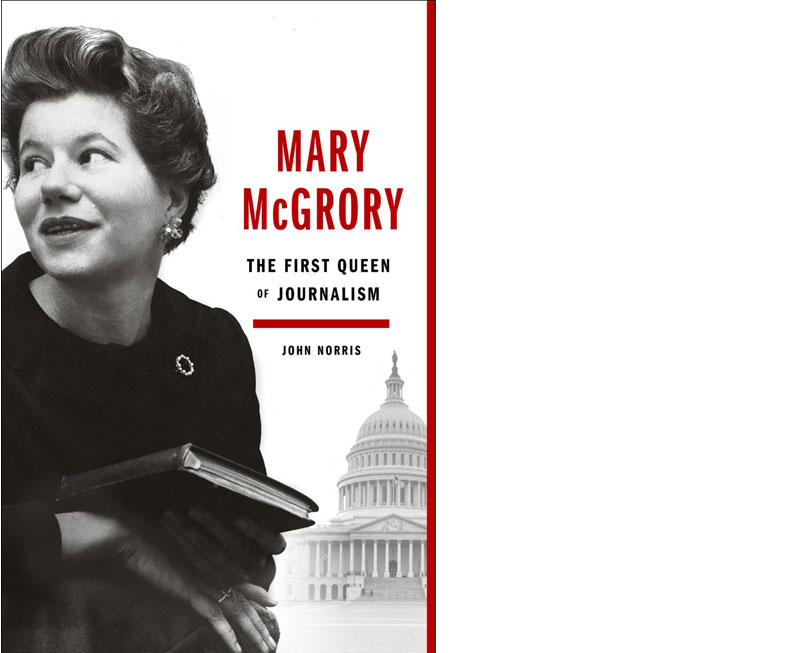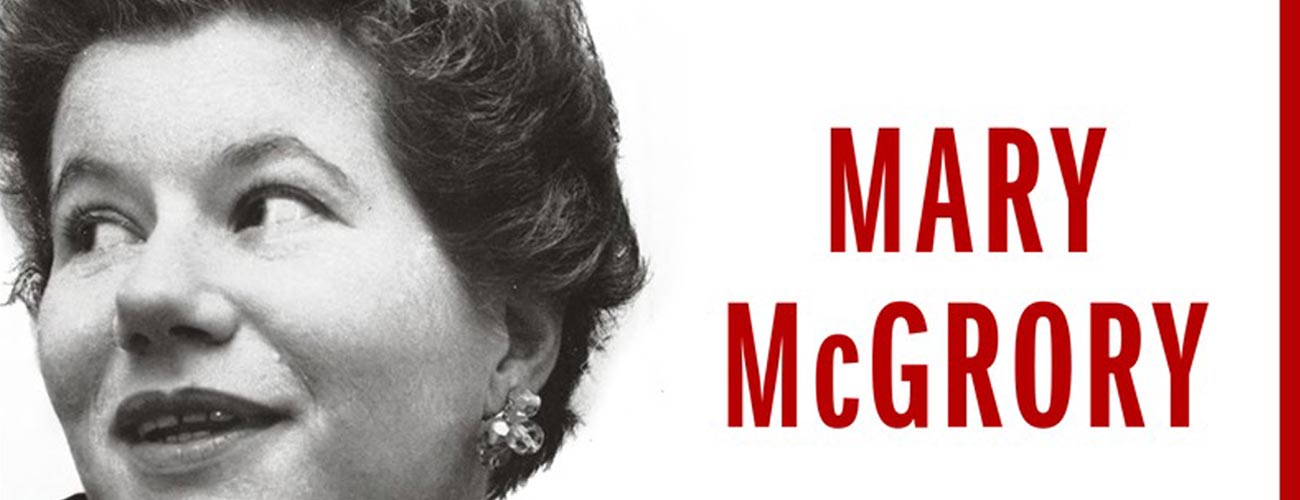If mary mcgrory (1918-2004) was indeed “the first queen of journalism,” the profession over which she reigned was dramatically different from our own—and not just because it was thriving and profitable.
The sexism that McGrory (largely) overcame or ignored was both more rampant and more overt. By today’s standards, the elite political press had extraordinary access to the officials and candidates they covered. And journalists were more likely to forgive not only politicians’ moral lapses, but their own.
Here, for instance, is McGrory’s generally admiring biographer, John Norris, on the Washington Star political columnist’s interlocking professional and personal relationships:
By any measure of journalistic objectivity, Mary should have recused herself from covering the 1968 campaign. She had lobbied Bobby Kennedy to get into the race. She and Gene McCarthy were close friends and drinking buddies. She’d recruited a man she was in love with, Blair Clark, to sign on as McCarthy’s campaign manager. These were not garden-variety conflicts of interest.
Hardly. And, as Norris tells it, McGrory’s ethical situation would only deteriorate. He speculates convincingly that the unhappily married McCarthy and the staunchly Catholic columnist pursued a romance—perhaps platonic, perhaps not. “The rumors of liaisons between Mary and McCarthy floated around the campaign,” Norris writes. He quotes David Mixner, a student leader and later a gay activist, as saying, “She adored him, and he adored her.” Norris even produces a poem that McCarthy penned in her honor, calling her a “queen” and describing her somewhat cryptically as “green-gold willow arched and graced among spines and angled limbs.” McGrory continued all the while to write sympathetically about McCarthy’s quixotic presidential campaign.

Mary McGrory: The First Queen of Journalism, by John Norris; Viking, 340 pages, $28.95
At best, journalistic objectivity is an embattled concept, and in any case the standards differ for a columnist: McGrory, though she did considerable reporting and insisted that her columns run in the news pages, was paid to express her views. Her charge was not to be “objective,” but to be opinionated, honest, and fair. She prided herself on shunning impartiality and shaping the debate. Still, McGrory’s deep involvement in the Democratic presidential campaign—as both a political player and an intimate of the two anti-war candidates—was not publicly disclosed and went far beyond what anyone today would consider permissible.
It’s impossible not to wonder what her bosses thought of McGrory’s compromised position. Could they have been ignorant of it? Did they turn a blind eye because their high-profile columnist was such a valuable commodity? Norris never tells us—an important omission from a biography that is otherwise wonderfully intimate, gossipy, and laced with delicious anecdotes.
The book’s intimacy is no accident; Norris had known McGrory both professionally and socially. Now executive director of the Sustainable Security and Peacebuilding Initiative at the Center for American Progress, Norris says he encountered her while working in communications for the State Department in the 1990s, and served as an occasional source. She also co-opted him—as she did Bobby Kennedy and other notables—into assisting in her longtime charitable work at St. Ann’s orphanage in Hyattsville, Maryland.
Norris writes about McGrory with genuine fondness and regard. He sees her life mostly as a grand achievement, but one predicated on a tragic choice. He explains:
Many newspapers in the 1940s and ’50s expected women to resign if they married. The choice between the front page and the white picket fence was stark. Mary felt that she could be a successful reporter or she could be happily married—not both—even as the 1960s tumultuously shuffled the American social order, opening doors for women and minorities that had long been closed.
Norris’ opening anecdote underlines the point. Newbold “Newby” Noyes, an editor at the Washington Evening Star, approached McGrory one day and asked loudly, “Say, Mary, aren’t you ever going to get married?” McGrory, who was the newspaper’s book critic and the author of a few political profiles, said that she hoped so, but didn’t really know. “Well, because if you’re not going to get married . . .,” Noyes continued, “we want you to do something different.”
From this blatantly sexist dialogue came McGrory’s life-changing break: an assignment to write about the 1954 Army-McCarthy hearings with what Noyes called “humor and color and charm and flair.”
The result, writes Norris, was that “suddenly a fresh, impertinent voice was leaping off the page, covering the biggest story in town with a decidedly liberal bent.” As McGrory would later recall, “All of a sudden people would want to adopt me, marry me, poison me, run me out of town.” Her innovation, Norris says, was “focusing on the personal side of politics and what made politicians tick.”
McGrory’s skills included an ability to listen, considerable charm, and an acerbic prose style that she polished in repeated drafts. (Working for an afternoon paper allowed her to write deep into the night.) She was an acute judge of character and an assiduous reporter, and her liberalism remained unabashed even as the country moved to the right.
McGrory was especially passionate in her opposition to the Vietnam War and her instinctive dislike of Richard Nixon. In a column on his infamous 1962 press conference after losing the California gubernatorial race, she wrote, “No questions had been asked except by Mr. Nixon of himself. None actually remained, the former vice president having disposed of everything, including possibly his reputation, in his epic tirade.” Nevertheless, at the funeral of the Rev. Martin Luther King, Jr., she and Nixon serendipitously shared a hymnal—a rare moment of harmony, and one of the biography’s many memorable images. As president, Nixon ranked McGrory high on his “enemies list,” and the IRS repeatedly audited her legitimate charitable contributions.
It was a sweet vindication when McGrory became the first woman to win a Pulitzer Prize for Commentary—in 1975, for her Watergate columns. Many colleagues believed the prize was long overdue.
Norris gives us just enough excerpts from her work—wry, pointed, lyrical, and astute—to convey its flavor. Here is McGrory on the 1984 Democratic presidential candidate: “The good news for Democrats is that Walter F. Mondale does, after all, have an instinct for the jugular. The bad news is that it seems to be for his own.” Assessing the 2000 race between Al Gore and George W. Bush, she called it “a battle between the unlikable and the unprepared.”
Norris also wonderfully evokes the glorious dishevelment and camaraderie of both the mid-century newsroom and the campaign trail. As a female columnist, McGrory helped open doors—and benefited from doors opening—at institutions such as the National Press Club and the Gridiron Club, which she had picketed for years. But she was less movement feminist than the sui generis monarch of the political press. When she traveled, she invariably had “bearers”—colleagues who carried her typewriter and luggage. “There has never been any journalist before or since who had so many eventual Pulitzer Prize winners serve as their bellhop,” Norris writes.
It no doubt helped that, as a young woman, McGrory was, in Norris’ words, “slim, vivacious and attractive.” But surely the quality of her work was her main calling card. Her insider status was reinforced by her legendary parties, where the drinks were invariably better than the food, bigwigs tended bar, and the entertainment included poetry, song, and dance. “Mary developed an almost unrivaled ability,” Norris writes, “to interact with candidates when they were out of the public eye.”
Beyond the great parties and her devotion to St. Ann’s, McGrory’s personal life was both mysterious and sad, Norris suggests.
Born and raised in Boston, McGrory was the first in her family to attend college. She revered her father, a postal clerk of Irish descent, but had a “chilly” relationship with her German-American mother and never spoke of the German side of her heritage.
McGrory briefly dated John F. Kennedy when he was a freshman congressman. Any romance was stillborn (“she was not one for empty assignations,” Norris writes), but an important friendship developed. McGrory’s columns chronicling the aftermath of Kennedy’s assassination were considered among her finest.
According to Norris, President Lyndon B. Johnson once came to her apartment, Secret Service men in tow, and propositioned her. “Mary, I am crazy about you,” he reportedly said. She turned him down flat but assured him that he was doing “a terrific job” as president.
The true love of her life, Norris tells us, was Blair Clark, a debonair reporter and later executive at CBS News whom she met on the campaign trail in 1956. Clark was married at the time and, though fond of Mary, seems to have epitomized ambivalence. “Mary was overcome by intertwined feelings of attraction and despair” but resisted an affair, according to Norris.
Even after Clark divorced, his indecisiveness hurt McGrory so much that she tried to sever all ties. His response was a charming, irritating letter, asking “for a retraction, for another lease on a life we’ve never lived, for more charity. I love you Mary, and you know it. It’s just that I won’t do (much of anything).” Norris, playing psychologist, speculates that Clark offered McGrory “a sense of real intimacy, with the safety of distance” and didn’t pose a risk to her career. Clark eventually remarried, choosing not McGrory but a Polish sociologist.
McGrory did have a significant romance late in life, with NBC reporter Bob Abernethy. Abernethy tells Norris that she was both “really wonderful” and “really tough,” and the relationship did not endure.
While McGrory may have been “softly sabotaging her chances for lasting love,” she clung tenaciously to the life that worked—her work life. McGrory adored the embattled but freewheeling Washington Star, where she played a leadership role. Through various management upheavals, she refused offers to leave. (Early on, James “Scotty” Reston wooed her for The New York Times—but told her she’d have to work the switchboard in the mornings.) When the Star expired, she finally jumped to The Washington Post but never warmed to the place. Despite infirmities, she worked into her 80s, until a stroke destroyed her ability to communicate.
As newspapers struggle and fade, Mary McGrory offers a paean to their most vibrant era, as well as a lovely portrait of one of its most distinctive characters. In a book filled with enticing stories, this one, dating from early in Gerald Ford’s presidency, seems to capture McGrory perfectly:
Julia M. Klein is a longtime CJR contributor and a contributing book critic for The Forward. She is a cultural reporter and critic in Philadelphia. Follow her on Twitter @JuliaMKlein.At the daily press briefing, the White House spokesman sonorously intoned to the gathered journalists: “This is not the time for partisan recriminations.”
A slender hand rose firmly from within the overwhelming male sea of reporters pressing their questions. It was Mary.
“If now isn’t the time for recriminations,” Mary wondered, in her soft but direct voice, “when would be the time?”


